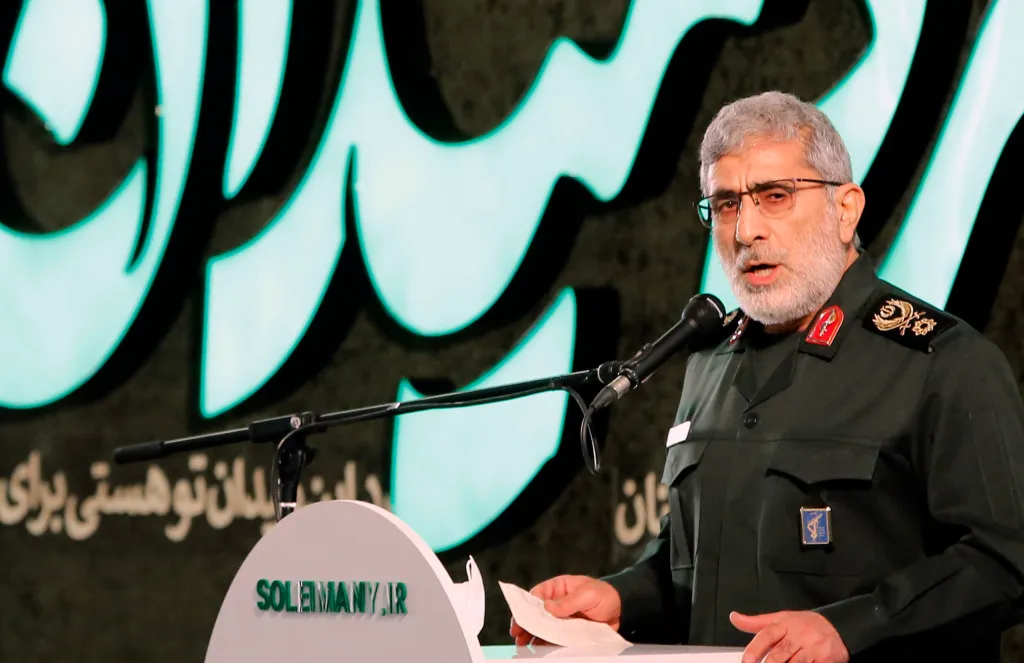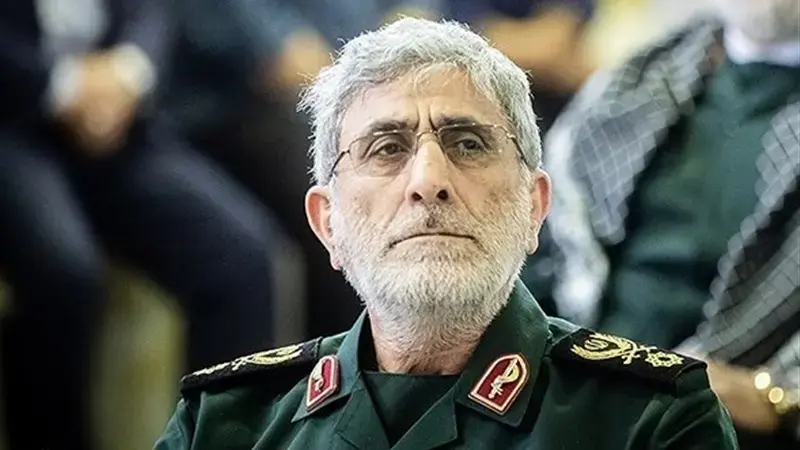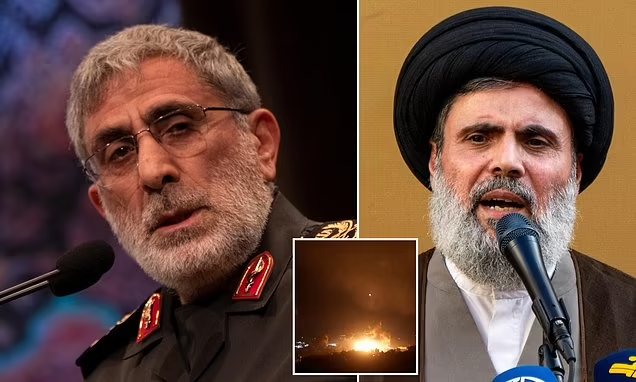Brigadier General Esmail Qaani, the commander of Iran’s elite Quds Force, finds himself at the center of a growing scandal that could shake the foundations of Iran’s military leadership.
Esmail Qaani, who rose to prominence after taking over the Quds Force following the assassination of Qassem Soleimani in 2020, is now being accused of being an Israeli spy.
His disappearance and subsequent house arrest, following a series of Israeli strikes targeting Hezbollah leaders, have fueled speculation that he may have betrayed Iran and its military apparatus to Israel.
These allegations come at a time when the Islamic Revolutionary Guard Corps (IRGC) is conducting an extensive investigation into Israel’s apparent ability to infiltrate and strike at high-level targets within Lebanon and Iran.
The story of Qaani’s suspected treachery has deepened over recent weeks, as more details have emerged about his avoidance of multiple Israeli airstrikes, his sudden disappearance after a Hezbollah meeting, and his ongoing interrogation by Iranian authorities.
Read : Israeli Troops Fire at UN Peacekeepers in Lebanon
This unfolding drama has caused widespread concern within Iran, raising questions about the security and loyalty of its military leadership.
Esmail Qaani’s Rise and Command Over the Quds Force
Brigadier General Esmail Qaani’s rise to leadership in the Quds Force was not unexpected. He had served as the deputy commander of the Quds Force for years under Qassem Soleimani, making him a natural successor. When Soleimani was assassinated by a U.S. drone strike in January 2020, Esmail Qaani was quickly appointed as the new commander.
Read : Israeli Foreign Minister Threatens Iran, Saying It ‘Deserves to Be Destroyed’
The Quds Force, a division of the IRGC, is responsible for Iran’s extraterritorial military operations, supporting groups like Hezbollah in Lebanon, militias in Iraq, and forces loyal to the Syrian government.
Qaani’s leadership style differs from Soleimani’s in many ways. While Soleimani was known for his charisma and direct involvement on the battlefield, Esmail Qaani has been more of a behind-the-scenes strategist.
His deep involvement in regional military affairs, particularly in Lebanon, Iraq, and Syria, made him a key figure in Iran’s influence in the Middle East. His command over the Quds Force allowed him to maintain these alliances and continue Iran’s support for proxy groups fighting against Israel and the U.S.

However, Qaani’s disappearance following a series of Israeli airstrikes on Hezbollah leaders has cast a shadow over his legacy. Reports suggest that Esmail Qaani was scheduled to attend a meeting in Beirut with top Hezbollah leaders, including Hashem Safieddine, but pulled out at the last minute.
Shortly after he left, Israeli airstrikes hit the bunker where the meeting was being held, killing several key figures. Qaani’s ability to avoid these strikes, along with his subsequent disappearance, has raised suspicions within the Iranian military that he may have been working with Israeli intelligence.
The Allegations of Espionage and Qaani’s Disappearance
The allegations against Esmail Qaani took a dramatic turn when reports emerged that he was being interrogated under house arrest in Iran. According to sources from Lebanon, Iraq, and Iran, Esmail Qaani is being investigated for possibly betraying Iran by leaking information to Israel.
The investigation began after the death of Hezbollah leader Hassan Nasrallah in late September 2024, when Israeli airstrikes targeted a secret meeting of Hezbollah and IRGC leaders in southern Beirut.
Nasrallah’s death sent shockwaves through Hezbollah and its Iranian allies. Shortly after his death, an investigation was launched to find out how Israel had managed to pinpoint his location so accurately.
As the investigation unfolded, suspicions began to fall on members of the IRGC and Quds Force who were working closely with Hezbollah in Lebanon. Qaani’s sudden disappearance following Nasrallah’s death and his avoidance of Israeli strikes on other Hezbollah leaders only fueled these suspicions.
Reports indicate that Esmail Qaani, along with other high-ranking Quds Force members, is being investigated for his possible role in leaking sensitive information to Israel.
Sources close to the investigation have suggested that Qaani may have been acting as an Israeli informant for some time, providing intelligence that allowed Israel to carry out precise strikes on Hezbollah and other Iranian-backed forces in Lebanon and Syria.

The most damning evidence against Esmail Qaani came in the form of his avoidance of the October 4 strike on a bunker in Beirut, where he was supposed to meet Hezbollah’s top leadership. Israeli airstrikes targeted the bunker, killing several key figures, including Hashem Safieddine, the heir apparent to Hezbollah’s leadership.
Qaani’s decision to pull out of the meeting at the last minute, combined with the fact that Israel knew the exact location and timing of the meeting, has led to widespread speculation that he was involved in the planning of the strikes.
Investigations and Fallout in Iran
As the investigation into Qaani’s possible role as an Israeli spy continues, the fallout within Iran’s military leadership has been significant. Iran’s government has officially denied the allegations, stating that Qaani is “alive and in good health” and continuing to fulfill his duties as the commander of the Quds Force.
However, multiple sources have confirmed that Esmail Qaani is under lockdown and is being interrogated by Iranian authorities as part of a broader investigation into Israel’s infiltration of the IRGC.
The investigation is not limited to Qaani. Several other high-ranking members of the IRGC and Quds Force are also being interrogated, as Iranian authorities attempt to root out any Israeli informants within their ranks.
This has led to widespread fear and paranoia within Iran’s military establishment, with everyone from field commanders to top generals being scrutinized for their loyalty.
One of the key figures being investigated alongside Esmail Qaani is Brigadier General Abbas Nilforoushan, who was killed in the same strike that took out Nasrallah.
Nilforoushan had recently taken over command of Iran’s operations in Lebanon, replacing Brigadier General Mohammad Reza Zahedi, who was killed in an Israeli airstrike in Syria earlier in the year.
Nilforoushan’s death has raised further questions about how Israel was able to carry out such precise strikes, and Iranian authorities are now looking into whether Nilforoushan or any of his subordinates may have been leaking information to Israeli intelligence.
The ramifications of this investigation are likely to be far-reaching. If Qaani is found to have been working with Israeli intelligence, it would represent one of the most significant betrayals in the history of the IRGC.
It would also raise serious questions about the security of Iran’s military leadership and its ability to protect sensitive information from foreign intelligence agencies.

In the meantime, the Iranian government is attempting to manage the fallout from these allegations. Official statements continue to insist that Qaani is fulfilling his duties and that the investigation is merely a routine inquiry into recent Israeli strikes.
However, the absence of any public appearances by Qaani and the widespread rumors about his house arrest suggest that there is more to the story than the Iranian government is willing to admit.
The allegations against Esmail Qaani mark a significant moment in the ongoing conflict between Israel and Iran. Qaani, once seen as a loyal and capable leader of the Quds Force, now faces accusations of espionage that could destroy his career and reputation.
As the investigation into his possible betrayal continues, Iran’s military leadership is facing a crisis of confidence, with fears of further infiltration by Israeli intelligence.
For Israel, the successful targeting of high-profile enemies like Hassan Nasrallah and Hashem Safieddine represents a major victory in its ongoing campaign against Iranian-backed forces in the region.
However, the full extent of Qaani’s involvement in these operations, if proven, could have far-reaching consequences for the future of Iran’s military and its role in the Middle East.

